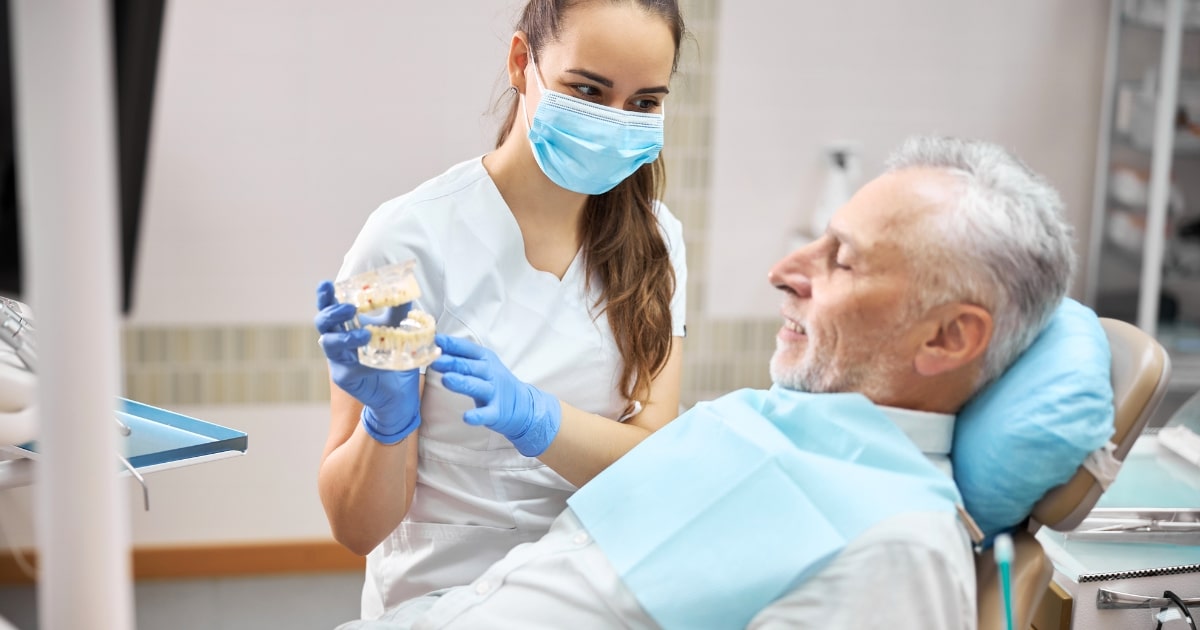Published on January 9, 2025

Dental care is indeed essential at every stage of life. However, it becomes even more crucial as you age. For you, maintaining oral health is not just about keeping your smile intact—it’s also vital for your overall well-being. With age, dental emergencies become more common and can pose unique challenges. Knowing what to do can help.
Read this blog to learn about the various steps that you can take to handle emergency dental situations for your aged teeth and gums.
Why Is Emergency Dental Care Important for Seniors?
As you age, your body undergoes various changes, and oral health is no exception. As seniors, your risk might increase due to factors like weakened teeth, gum disease, and the impact of medications. Your dental problems can quickly escalate if not addressed promptly. Immediate care can prevent further infection and potential long-term damage.
As you age, you might need to take more medicines. Certain medications can cause dry mouth and make you more susceptible to tooth decay and gum disease. You may also have conditions like diabetes or heart disease, which can complicate dental care.
What Are Some Common Dental Emergencies Seniors Face?
Here are some dental emergencies that are most prevalent among older adults like you:
- Your weakened teeth, combined with factors such as tooth grinding, can lead to fractures or chips.
- If you wear dentures, a lost or damaged denture can cause you significant discomfort and lead to sore spots in the mouth, making it difficult for you to speak or eat.
- With age, your risk of gum disease and infections increases. Gum infections can cause painful abscesses and severe complications if left untreated.
- You might experience severe pain due to cavities, exposed roots, or cracked teeth. Sensitivity to temperature changes can make you vulnerable to sudden toothaches.
See an emergency dentist in Northside Richmond for assistance.
How To Respond to Common Dental Emergencies:?
Knowing how to respond quickly to dental emergencies can prevent further damage and alleviate discomfort. Here are some helpful steps:
Tooth Fracture
If your tooth is fractured or chipped, save the broken pieces, rinse the mouth with warm water, and apply a cold compress to reduce swelling. Seek dental care as soon as possible, as you might require bonding or a crown.
Lost Teeth
If your dentures are lost or damaged, avoid attempting to repair them yourself. Use an adhesive as a temporary measure. If they are ill-fitting, see a dentist as soon as possible.
Gum Infections
Do you notice any signs of gum infection or abscesses, such as swelling, redness, or a painful lump? Seek dental care immediately. Until then, rinse with warm salt water and apply a cold compress to manage pain.
Severe Tooth Pain
For sudden tooth pain, rinse with warm water and floss gently to remove any debris. Avoid placing aspirin directly on the gums, as it can burn the tissue. If the pain persists, seek immediate care.
How To Reduce the Risk of Dental Emergencies?
Here are some strategies to help you reduce the risk of experiencing dental emergencies:
- Visit a dentist regularly for check-ups and cleanings. They can detect issues early and prevent more serious problems.
- Brush twice a day with fluoride toothpaste and floss regularly. If you have limited dexterity, use electric toothbrushes to make oral care easier.
- If you wear dentures or have a tendency to grind your teeth, consider using a mouthguard. It can prevent damage during sleep or during an accident.
- A balanced diet rich in calcium and vitamin D can make your teeth and gums strong. Limit sugary foods and drinks to reduce the risk of tooth decay.
How to Find Emergency Dental Care for Seniors?
When a dental emergency arises, it’s essential for you to find a dentist who can provide prompt care to keep your oral health intact.
Look for dental professionals specializing in geriatric dentistry or who have experience treating older adults. They are more likely to understand your unique needs and challenges. Some organizations offer emergency dental hotlines or can direct you to local emergency dental clinics. Check with your local health department or senior services for assistance.
Your caregivers play a critical role in helping you manage senior dental emergencies. They can help assist you with daily oral care and ensure effective communication with dental professionals.
Emergency dental care can help you face unique challenges related to aging, medications, and overall health. By understanding common dental emergencies, knowing how to respond quickly, and implementing preventive measures, you can maintain better oral well-being and reduce the risk of severe dental problems.
Are you ready to deal with age-related oral issues? Seek professional care today!
